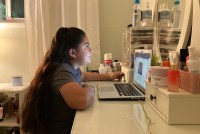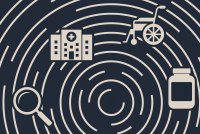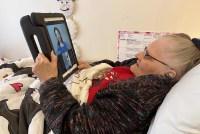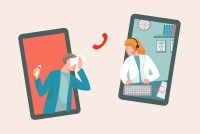Latest KFF Health News Stories
What a Bison Goring Can Teach Us About Rural Emergency Care
Millions of Americans live in “ambulance deserts” — areas that are more than a 25-minute drive to the nearest emergency medical services (EMS) station. The most rural areas can be more than an hour away from help. These sparsely populated communities can have trouble sustaining ambulance services, if small patient volumes and low reimbursements […]
When a Quick Telehealth Visit Yields Multiple Surprises Beyond a Big Bill
For the patient, it was a quick and inexpensive virtual appointment. Why it cost 10 times what she expected became a mystery.
El condado de Los Angeles ofrece terapia virtual gratuita de salud mental para estudiantes
La teleterapia desempeña un papel cada vez más importante en las escuelas del país, a medida que educadores y trabajadores sociales se enfrentan a la presión de abordar los crecientes problemas de salud mental.
LA County Invests Big in Free Virtual Mental Health Therapy for K-12 Students
California is spending almost $5 billion to address a growing youth mental health crisis. In Los Angeles County, a contract with teletherapy provider Hazel Health is funding free therapy sessions for all interested students. School districts are grateful for the additional support, but express concerns about the remote arrangement.
Journalists Discuss Floridians Being Dropped From Medicaid and Tips for Telemedicine Visits
KFF Health News and California Healthline staff made the rounds on national and local media this week to discuss their stories. Here’s a collection of their appearances.
La atención primaria está cambiando: el acceso y la calidad están en juego
Una relación sólida y duradera con un médico de atención primaria —que conozca el historial del paciente y pueda vigilar nuevos problemas— se ha considerado durante mucho tiempo la base de un sistema sanitario de calidad.
Will the Doctor See You Now? The Health System’s Changing Landscape
The “front door” to the health system is changing, under pressure from increased demand, consolidation, and changing patient expectations.
The DEA Relaxed Online Prescribing Rules During Covid. Now It Wants to Rein Them In.
Supporters say the proposed rules would balance the goals of increasing access to health care and helping prevent medication misuse. Opponents say the rules would make it difficult for some patients — especially those in rural areas — to get care.
Journalists Discuss Enduring Effects of Long Covid and Handling of Opioid Settlement Funds
KFF Health News and California Healthline staff made the rounds on national and local media this week to discuss their stories. Here’s a collection of their appearances.
Journalists Track Opioid Settlement Cash and Fees for Telehealth Visits
KFF Health News and California Healthline staff made the rounds on national and local media this week to discuss their stories. Here’s a collection of their appearances.
States Step In as Telehealth and Clinic Patients Get Blindsided by Hospital Fees
At least eight states have implemented or are considering limits on what patients can be billed for the use of a hospital’s facilities even without having stepped foot in the building.
Minnesota Overhauled Substance Use Treatment. Rural Residents Still Face Barriers.
A recent policy change in Minnesota promotes quick evaluations and care for people with substance use disorders. But because of gaps riddling rural treatment systems nationwide, the promise of swift care isn’t reaching rural Minnesotans.
End of Covid Emergency Will Usher in Changes Across the US Health System
The May 11 expiration of the federal government’s pandemic emergency declaration will affect patient care across a broad range of settings, including telemedicine, hospitals, and nursing homes.
Mental Health Care by Video Fills Gaps in Rural Nursing Homes
In-person mental health care is hard to arrange in rural nursing homes, so video chats with faraway professionals are filling the gap.
Journalists Discuss Medicaid Unwinding and Clawbacks
KHN and California Healthline staff made the rounds on national and local media this week to discuss their stories. Here’s a collection of their appearances.
Virtual or In Person: Which Kind of Doctor’s Visit Is Better, and When It Matters
While there are no hard-and-fast rules about when to opt for a telehealth visit versus seeing a doctor face-to-face, physicians offer guidance about when it may make more sense to choose one or the other.
It Takes a Village: Foster Program Is a New Model of Care for Indigenous Children
A foster care program on the Cheyenne River Reservation in South Dakota is attracting attention from officials elsewhere as they search for ways to reduce trauma inflicted on Indigenous families, who’ve faced generations of high rates of family separation.
It’s ‘Telehealth vs. No Care’: Doctors Say Congress Risks Leaving Patients Vulnerable
Congress’ $1.7 trillion omnibus spending package included a two-year extension of pandemic-era funding that helped telehealth services grow nationwide. But that cash bridge, embraced by those delivering services to patients in rural areas, doesn’t provide much certainty for the future of remote medicine.
¿Será tu celular tu próximo consultorio médico?
La yema del dedo presionada contra la lente de la cámara de un celular puede medir la frecuencia cardíaca. El micrófono, colocado junto a la cama, puede detectar apnea del sueño. Incluso el altavoz está siendo modificado para monitorear la respiración usando tecnología de sondas.
Will Your Smartphone Be the Next Doctor’s Office?
Entrepreneurs see smartphones as an opportunity to meet patients where they are. But many app-based diagnostic tools still need clinical validation to get buy-in from health care providers.






















